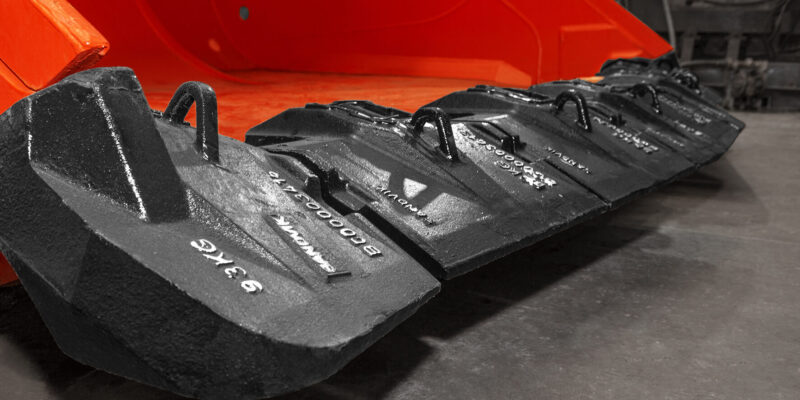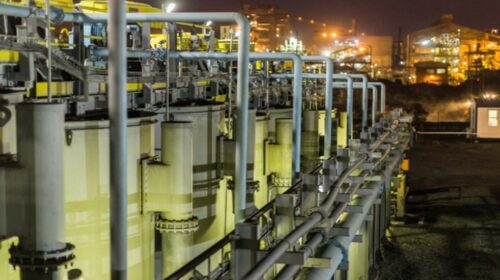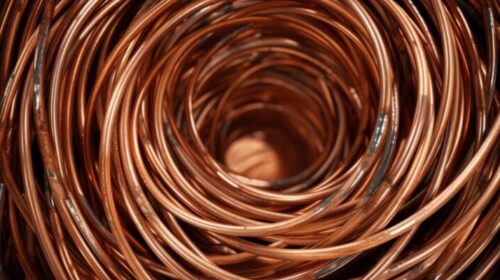Byrnecut and Sandvik collaborate on new MAKO ground engaging tool
Sandvik, with the help of Australia-based mining contractor, Byrnecut, has developed a new and improved Ground Engaging Tool (GET) that, the OEM says, reduces downtime and cost-per-tonne mined.
Over a four-year period, Byrnecut has been instrumental in the development of this new system, MAKO™.
In underground mining, wear and tear is unavoidable, and nowhere is it sharper than for the buckets and the shrouds fitted to loaders.
In the most abrasive conditions, the shrouds can wear out in just a few hundred hours of work. Replacing them – especially when they are welded on – can take multiple shifts: valuable hours where the machine is out of action and productivity dented.
To speed up this process, in 2001, Sandvik introduced its Shark™ range of Blue Pointer™ ground engaging tools (GET) – becoming the first retensionable shroud system for the underground market. Blue Pointer can be summarised as shrouds using mechanical fixings that are significantly faster to replace, Sandvik says.
Even though Sandvik says the system was the market leader in underground mining, it still looked to improve upon the Blue Pointer.
With that in mind, in 2018, Sandvik set about developing a replacement, MAKO, collaborating with internationally renowned specialist mining contractor, Byrnecut.
MAKO continues the shark theme – with a Mako being a shortfin predator – and brings with it several advantages: an innovative patented locking mechanism, hammerless removal system, cast corners improvement (patented) and additional wear indicator, to mention a few.

By far the biggest improvement in terms of reducing downtime and cost-per-tonne mined can be found in the MAKO corner shrouds. Normally, corners – which have a much harder life – tend to wear out and need changing at the mid-life point, compared with the rest of the shrouds. In extreme conditions an additional two ‘half corners’ can be needed for every set of normal shrouds. But thanks to improved material and design, with MAKO there is no need for part-life replacement corners, according to Sandvik.
These improvements have been put to the test in the field, with Byrnecut instrumental in putting prototypes through their paces. The contractor trialled the concept at one of its most abrasive sites – the Capricorn copper mine near Mount Isa in Queensland, Australia.
“Sandvik came along with a team of engineers and said: ‘Right, are you willing to help us develop MAKO?”, Gary Boswell, Byrnecut’s Chief Maintenance Supervisor at the mine, said. “So, we got on board and had a good working relationship with Sandvik. Right from the start we were looking for the same outcome – to lower total-cost-of-ownership and achieve a 1:1 [corner:shroud] ratio, so that we only changed corners when we changed all the other shrouds.”
The Capricorn mine has five Sandvik loaders (LH621s) fitted with 10.7 cu.m buckets. Boswell expects to get 7,500 hours out of a bucket and, because of the aggressive nature of the rock, replaces the GET every 500-550 hours, on average. That is roughly 14 sets of MAKO per bucket life. So, making them last longer and easier to change in one go can make a significant difference to downtime and cost over that lifetime.
MAKO has not achieved its durability performance by simply adding more metal; it’s put metal where it matters. The overall MAKO system also has a very favourable weight/performance ratio, according to Sandvik.
The first MAKO GET was fitted at Byrnecut’s Capricorn site in January 2019. Despite the remote location, the buckets were monitored by Sandvik experts on a weekly basis. It soon became clear that the new range was especially durable – lasting, on average, 12% longer than the best of the rest, as well as avoiding the need for half-life corner shrouds, according to the OEM.

“The first prototype we thought was okay, but there is still room for improvement,” Michael McCormick, the Shark Loadmaster who was hands-on with the development of MAKO, said. “The feedback we got from Gary [Boswell] and the team at Capricorn really helped us understand the issues they were having. When something cropped up, we could quickly develop a short-term ‘hotfix’, before developing a longer-term solution. For instance, we found an opportunity to improve the locking system and had to adapt the pin assembly to ensure the push-off feature was truly hammerless.
“As is natural, we had some performance issues with earlier prototypes, and it took us a couple of goes to get it right. But the ability to work in real time with Gary’s team was the key to enabling us to respond rapidly with quick fixes and validating their effectiveness.”
Boswell concluded: “Safety is paramount, and we did not want our guys hammering or using oxyacetylene to get the shrouds off. But Sandvik fixed that with the push-off feature that can handle worn-out GETs; even those with lifting lugs eroded through use. The issue of transporting heavy shrouds has also been resolved by a new lifting device, which is very effective.”
Sandvik added: “When, like Byrnecut at the Capricorn mine, you are using several hundred [GET] sets each year, the MAKO’s collective benefits add up to significant productivity, cost, time and safety enhancements. The cleve design of MAKO, perfected in the field, helps keep buckets meet their availability and productivity targets.”
Source: international mining
82 total views , 1 views today





